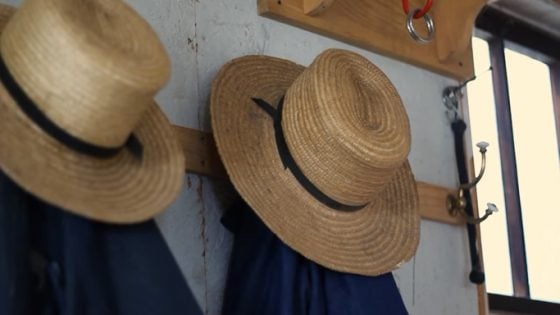Why Lorina Mast Left The Amish
Why are we fascinated by stories of people both joining – and leaving – the Amish?
Over the ten years I’ve run this website, stories on those topics have consistently gotten a lot of attention here.
We could point to several reasons. For one, I believe entering or exiting a community with firm boundaries contains its own built-in potential for drama.
Amish-born writers like Ira Wagler and Saloma Furlong have penned memoirs revealing the pain and struggles experienced by some drawn to a life beyond the Amish fence.

Amish-raised Lorina Mast recently told her own story at an event detailed in this Geauga County Maple Leaf article.
Like Saloma, Lorina hails from the Geauga County, Ohio settlement, a large Amish community with a reputation for challenges among its youth.
Across Amish society, only a relatively small percentage chooses not to be Amish. At the young age of 20, Lorina opted for that path.
Today, Lorina is a chair yoga instructor, and mother to a seven-year-old son. Below, you’ll find main points of her story, and my comments (read it in full at the link above).
A Relationship with an Outsider
Lorina’s story has shades of Amish fiction novel drama – the allure of a forbidden romance outside the community:
It was February 2010. His name was Josh. He drove a truck and wasn’t Amish.
“We were young,” Mast said, with hints of her Pennsylvania Dutch accent still evident. “I was 19 and he was 18.”
It was her Rumspringa — a period when some Amish youth experience greater freedoms before they choose whether or not to remain in the Amish community — and she liked to listen to Lady Antebellum’s “I Run to You.”
“Sometimes when I think about it, I don’t necessarily feel guilty, but maybe more sympathetic for my family because of the judgment that may be cast on them because of my decision,” said Mast.
On some level most Amish parents want their children to also join the faith. One reason (I suspect most would say this is not the most important reason) is that having all or most of your children choose an Amish path reflects well on you in the community.
It sounds like her parents may have felt negative social effects of her leaving. It probably didn’t help that it was to be with a non-Amish person.
Unconditional Love
Though her family may have felt backlash, Lorina’s picture of her parents is glowing:
She didn’t leave because of her family or the Amish. She left because of her.
Her parents taught her and her two brothers unconditional love.
“My parents would always find time for us,” Mast said. “I’m sure there a lot of people that think their parents are one in a million and to me, yes, absolutely my parents are. They are my heroes. They never made me doubt their love for me. I can’t think of better role models for my son.”
Sounds like Lorina has a truly great mother and father.
The Drama of Departure
In some of the most publicized cases, leaving the Amish is done in dramatic fashion. Likewise, Lorina crept away under darkness:
I left in the middle of the night so that I wouldn’t have to see the disappointment on my parents’ faces and possibly breakdown and decide not to leave.
…
It was 2 a.m., wearing the dress her mom had sewn, she left with life’s necessities, as she rehearsed in her mind what she would do.
At the time, she was pregnant and age 20. Josh had turned 19.
Josh was killed tragically, and never met his son. But Lorina shares that her son sees his grandparents daily. I assume by this, that Lorina sees them often as well.
On the other hand, some stories of leaving end with the leaver ostracized, having little contact with loved ones.
Those dramatic stories understandably get the most attention. For example, see the NatGeo Amish: Out of Order series of a few years ago, along with the example of the Columbia, Missouri ex-Amish community.
Lorina’s story seems to have had a happier resolution:
“I know that I did, in fact, disappoint my parents in every way possible with my decision, but I also know that their love for me never once faltered. Yes, I felt guilty at first. I was taught that this is wrong and that I am killing my family by leaving. But I also knew that I had a voice and the right to choose the life I wanted to make for myself.”
Fulfillment Outside the Amish
So what drove Lorina to leave, when the large majority of her peers opt for the life they were born into?
“I knew I had to. I knew I would never be truly happy living the rest of my life without fulfilling everything that was possible outside the Amish life.”
Lorina is an Amish-born person who felt that life outside the Amish would be a better option. Actually achieving this life is easier for some than for others.
Besides the difficulty of the actual departure, relationships can be damaged. And when you’re not in the Amish community any longer, even if your family has only good feelings for you, you still miss out on all that comes with being a member of the church community.
We don’t have a book full of details here on Lorina’s story. But from what she shares, Lorina’s tale seems to have had a positive outcome – with the unconditional love of her parents being an enormous part of that.







Love is never ending
I believe that love never ends any relationship. Perhaps love tests it, perhaps questions it, but I believe that love is the starting point for the true manifestation of God in us as humans.
Through my years of learning to truly live a life with peace as a primary goal, I’ve come to the conclusion that only with love of God and then love of others is my life worth living.
Peace,l
I agree. There is a song that has a very influential phrase to me
“No matter what I say. No matter what I do. No matter what I believe, I am bankrupt without love.”
It is nice to read of an Amish leaving and not losing the love of family in the process. After all Jesus taught us that unconditional love is at the heart of Christianity. Sounds as if this family lives that out.
I appreciate your kind words.
My family is truly a gift from God.
Lorina is very fortunate and blessed
To be supported by her parents is such a beautiful thing. However, being loved unconditionally and not having strings or controls from the parents attached is a miraculous blessing.
What I have learned love is from my second dad what parental love, unconditional love from my second dad was. No strings attached.
She is so blessed.
I also left the Amish at an early age……. no regrets…..relationship with my family is great…..truly true love……have a bookstore in our community, serving the Amish… would encourage you to write a book…….. these stories need to be written, because the world needs to know.
Eli Hochstetler
Thank you for your comment…..I’m glad that your relationship with your family is great. I have always been just fascinated with the Amish way of life and actually got to visit Lancaster this past year….just a beautiful way of life! Blessings to you and yours Eli 🙂
I’m so happy you also have a great relationship with your family!
It’s good to know there is love after leaving
When my husband died (July 21, 2018) I felt lost, abandoned and so alone. It was as if I had died with him because this is the way my community and both my family and my husband’s family treated me. I worked he wouldn’t. My parents came out to help here and there (they are up in their years), my oldest sister cane more frequent or paid gas for me to come see her, my son came here and there but treated me as if I were some disease and would not allow his kids to come over or even in the house; my daughter treats me basically as if I am dead unless she needs someone to grip at and calls to grip st me or at me about her husband and his family. I used to go to my aunts house every after work until they laid me off back in December 28, 2018. Now, I get sporadic phones calls to see, if I am alive. I stopped calling everyone to see how long it takes them to call.
It is a lonely life. I know I am loved somewhat. This I know. But I wish I had the backbone assurance of love.
You are so blessed and it warms my heart to know your family did not annihilate you but chose to stay with you in love.
Adele, thanks for sharing. Your message moved me and I’m sorry to hear that you have been made to feel alone after your great loss. People love you, and I hope you can somehow feel less lonely and find comfort and community in your life.
In response to Adele Dodd
Adele, I am so sorry for the loss of your husband. My husband went to Heaven on July 15, 2018, six days before your husband. I hurt for you that you have not had support. I cannot even begin to imagine going through the grief period without the support of my family. My heart aches for you. Please try to find a GriefShare group. You can find a local one online. I will be praying for you. God bless you.
Eli, I just read that you are selling your bookstore. Congrats on a great 44-year run! I remember the promo we did 9 years ago, was impressed by your great energy and enthusiasm. Best to you.
I am glad that after you left your relationship with your family is still great. I am just fascinated with the Amish way of life and actually got to visit Lancaster last year…..so beautiful! Blessings to you and yours Eli 🙂
I live not far from the community that Lorina was a part of. We visit often, and shop at their stores. My only concern is that the English (or in this area, Yankee world), there is so much to offer the young people that can destroy their lives. It is common knowledge that Ohio has the highest rate of deaths from Heroin and Fentanyl. And yes, these drugs have crept into the young ones in the Amish communities all over Ohio. I grew up in a strong Christian household many decades ago. I remember like the Amish teens, searching for excitement that my parents tried to protect me from. It caused grievous consequences. I think that most Amish parents, like mine are just trying to protect their children from some of the bad things that this world has to offer. I hope that Lorina Mast has a close relationship with the Lord, and is bringing her son up to know and love Him.
drug use
I live only 20 minutes from the route they call the heroin highway, just south of Joliet, IL. I’ve heard it can get pretty bad around those areas. I never understood drug use but I’m guessing it’s partially peer pressure, boredom (Ever been to Illinois? I rest my case.)or just a form of escape/ rebellion. Still, I don’t understand why you would consciously use drugs. (If you’re prescribed something or OTC, I have no issues.)
Ohio had so many highways where drugs are coming in. We have the highest number of overdose deaths in the nation. Sadly, as English or Yankee parents, we cannot protect our children. And as protective as the Amish community has been with their children, the junk is getting to those teens and young people, also. I have never heard how many have overdosed. I pray none, if any. Every parent hurts when they lost a child. I have lost children, and have had two struggle with drugs. But thankfully, I have not lost one to them.
Lorina Mast's baby's father
I thought to myself how terrible that they found love and hoping things will work out, with a baby on the way. I just wondered How he “accidentally” died tragically?
Lorina Mast's baby's father
I thought to myself how terrible that they found love and hoping things will work out, with a baby on the way. I just wondered How he “accidentally” died tragically? What happened to her boyfriend? Or were they married first and had a little time together at least?
Hi Valerie,
In response to your inquiries about my son’s father, he had a relative that had severe mental problems that were never addressed which led to the death of Josh (my sons father)and a voluntary manslaughter charge and prison time for the relative.
We were not married but had discussed it.
I don’t believe all was lost. From this, I have learned forgiveness and the relative received the help he needed although it is very unfortunate that it had to be because of a tragedy.
I am a firm believer in there being a reason for everything that happens and although sometimes I may not understand the reason, I know that there is in fact at least one. 🙂
Nothing Happens By Accident ...
Most of the time, … we called “good things” those things which happens to fit/match our own expectations, and …”bad things,” those things whose outcome are contrary to our expectations … Yet, … in God’s Economy (God’s Will and God’s Plan), there are only ALL THINGS THAT WORK TOGETHER FOR THE BENEFIT OF THOSE WHO LOVE GOD …
Hi Carol,
It sounds like you’re familiar with the Amish community 🙂
There are definitely many many temptations and terrible things to get into no matter Amish, non Amish, black, white, 15 or 50. This is where self responsibility and a positive background are extremely important. Any good parent will want to protect their children from all the bad things in the world. I wish I could do this for my son. I wish I could go to school with him and guard him from all the influences of drugs and sex and violence. But I can’t. I can only do what my parents did and teach him in the best way possible about consequences and good decisions and there will be times he will be faced with temptation and make a bad decision, but then I can hope and pray that from my teaching and His will, that he will learn from his mistakes. Regardless, I will love him just as my parents have/do love me.
My faith in God has grown tremendously since I left the Amish and my son and I have daily conversations about him. 🙂
Lorina, I am so happy that you are very close to the Lord, and raising your son to know Him. That is so important. I have a 16 year old great grandson who has been pretty sheltered, by homeschooling. He slacked off on it, and my granddaughter enrolled him in a school, that prepares the students for getting a job. I am concerned, as the school is in a bad area in Cleveland, with a lot of worldly influences all around him. All we can do is pray for them. I learned with my own kids, that nothing I did could save them from themselves or the world. After losing my oldest son, I learned to place the rest of my family in God’s hands, and leave them there. I have learned to fully trust Him, as I know that He loves them even more than I do. Wishing you and your son the best. May God richly bless you both. With His love, Carol
Amish life and new birth
I am always confused as to how many Amish communities approach the late teen years of their children. There is simply no doctrine in the Bible that allows anything like “rumspringe”. Jesus also clearly taught that an individual must be born again and become a new creature in Christ, receive instruction and be baptized in order to be His disciple. I hardly hear anything of new birth conversion in Amish. It seems like people simply choose to stay in any given community and decide to accept the boundaries given. If possible they bend the rules to where it is still acceptable, but clearly pushing the fence, not demonstrating any cross bearing or dying to self. With that in mind, it doesn’t come as a surprise that youth who have been raised Amish leave and “enjoy the things of the world for a season”. If the biblical, not traditional, way was taught and observed there would be a new birth experience and fruit of the Spirit evident upon their decision to join/stay with the community. I am also afraid that many of the Amish will have a rude awakening when Judgment Day arrives and Jesus tells them, “I never knew you.”
That won’t be limited to the Amish, by any means…
Jedaho,
If you take the world as a “whole”… just take the full number of humanity… now decide how many youth follow the new birth at age 16 or close to it… Don’t make it Amish or Yankee or Jew…now think of the percentage of 16 yr olds…that might fall in the “rumspringa” role.
What I don’t like is how the outside world sees only the rumspringa youth and not the thousands that don’t do rumspringa like that.
Yes, I’m Amish. I tried to teach my children right. I am not perfect. jesus died that we might be free…so I try to live for HIm.
Mary, I am so glad that you shared that. Sadly, so many Christians are not aware that many Amish have the new birth, or are born again. Yes, some may just be part of the Amish culture or lifestyle, and stay because they are familiar with it. But praise God, so many know Him as their Savior!! Those of us who know Him will be rejoicing in Heaven together. I am sure that I will see you there.
So well said, Mary! As an Amish father to teens and young adults, I can say I am 100% agreed with you.
Well said, Mary!
The "Choice" period
Yes, I think this is very dangerous, after being so careful raising them and keeping them from any bad influence. It is rather odd. I know that at some point they will have to make their own choice. But opening the door suddenly and with no direction or guidance to naive (yes, sheltered!) young people, seems almost heartless. There are many temptations and shady characters out there, not to mention what tv, magazines, the World’s “ideas” of what is right and wrong today–so many bad influences…. It is so easy to lose your anchor, or feel doubts by even foolish reasoning (example: my son said if God created everything, then he created Evil too…(no, he gave us Free Will to choose. Some will choose bad. Satan thought too much of himself, and kept thinking about He would like to be followed/worshiped). It appears my daughter kept thinking about this. Some bad things happened to her too, (when she left God’s good clean protective rules) and I think she thought God should have protected her from these things… At any rate, my point is that we should always be careful with our children. Not leave them on their own with Worldy influence only all around them.
Jedaho, you are describing Evangelical Christian beliefs. The Amish are from the Anabaptist tradition. You might want to research the differences and similarities between these various ways of practicing Christianity before casting judgment on one group or another.
As for the answer to “why” the Amish have Rumspringa, the decision to be baptized into the Amish is taken very seriously and is made in full recognition of what the wider world offers and what sacrifices one must make to be Amish.
Your comment makes me shudder, have you heard of “Better than thou” or “misinformed” lets just say this…. let the one without sins throw the first stone.
Lorina,
Did you leave before or after your baptism and did that make any difference in your relationships?
Warm regards,
Terry
Terry, I don’t know if Loring will see your question. I am sure that I read that she left before baptism. It may havery been in the newspaper article that they give credit to above.
Hi Terry!
I left before baptism because I knew it might be more difficult to maintain a relationship with my family had I chosen to become baptised first.
I would like to think that no matter being baptised or not, my family wouldn’t have pushed me away but I can’t be certain.
Regardless, I am extremely grateful for their love and support throughout my life.
New Birth
The Amish come in different varieties. The New Order Amish are more Evangelical than Old Order Amish, and have views very similar to what one would find in Evangelical churches regarding the new birth, salvation by grace, and assurance of salvation. Although this doesn’t mean one would not find those views among many Old Order people.
i really enjoyed the comments in this piece. i love to read amish fiction but often wonder at accuracy of them. a lot of the amish i read about dont believe in talking about ther christianity to others. the bible says we are to spread the word they dont pray out loud. which is in itself not such a big deal but feel its too personal. it shouldnt be. i am glad that lorna masts story has a relative happy ending. i dont think i could be amish, not because of lack of wordly goods but being told what and what not i can do. a lot of the things that they are allowed to mdo arent even biblical.
Thanks
Diane, as a proud “Yankee,” I am enamored by the practices and devotion of all the Amish I hear about and communities I visit. So, your comments echo my own thoughts and questions about this fascinating group. I know there are many sub-groups or whatever, but when I see the carriage signs with my RV, I slow down, admire the landscape, and love seeing the interaction among the populous. Just one thing, however, to my Amish friends, please don’t generalize in thinking all “Yankees” are crude, impolite, or uncaring about your ways or beliefs. Most of us respect all of what you represent…even the horse dung.